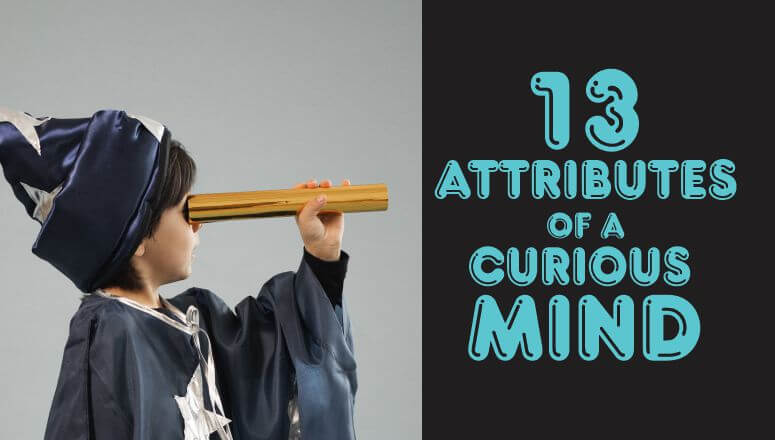Unleash the power of curiosity with the attributes of a curious mind and reap the reward of endless discovery, learning, creativity, and growth.
Our surroundings and environment are full of wonders that can spark curious thoughts in a curious mind.
The intricacies in nature and the wonders that abound are the sources that can trigger one to ask big questions and get immersed in the quest for answers as advised by Emerson in The Conduct of Life.
In this relatively short post, I have compiled identifiable attributes of the curious personality and how to cultivate the same for the individual who seeks to excel in life.
Who is a Curious Mind?
A curious mind is one that is eager to learn and explore new things. It is characterized by a strong desire to ask questions, seek answers, and gain knowledge about a wide range of topics.
Its mind can never be contained nor get stuck in a rut. He is continuously fascinated by things around him that he keeps learning.
It is open-minded and willing to consider different perspectives and ideas, even those that challenge its own beliefs and assumptions.
Also, it is often associated with creativity, innovation, and intellectual growth. It is a valuable trait that can lead to personal and professional success in many areas of life.
Related: How to Motivate Yourself to Achieve Life Goals
Curious Mind Attributes

A curious person would exhibit some attributes that are responsible for its desire to know more, achieve and satisfy their knowledge. Here are the core attributes of a curious mind:
1. Strong Insatiable Curiosity
Curious people are insatiable with knowledge. They try to unravel the forces that make things work and this makes them more creative and genuine in whatever they engage in.
Their curiosity makes them ubiquitous in knowledge. When you constantly ask why, what, where, and why things are the way they are, and take extra steps to find out, you are a brilliant person.
Recommended: Important Life Lessons You Should Master
2. Late sleepers
Researchers have found that curious persons are more likely to go to bed late than people who are not.
This is partly because they have set the time aside to delve into the discovery of knowledge owing to their curiosity.
A study of many young people showed that curious adults spend more time awake during weeknights than their less curious counterparts.
This hinges on the non-conformist nature of a curious mind. They most times find it ridiculous to believe in going to bed early to wake up early.
They believe they know how to manipulate situations and get things done when they want to.
Also Read: What Are The 5 Fundamental Human Instincts?
3. They ask the big questions
A curious person wonders a lot about how things happen or behave the way they do. The universe, the weather, the intricacies of nature – they ask for the reason for everything.
These unending questions about the conduct of life and the universe are inspired by strong imaginative minds on the intricacies of nature.
I remember a friend in the University whom we nicknamed Questionnaire. The man was always asking “What about if…?”.
He always wanted to know where each step would lead and the possible consequences.
He did this in order to avoid unintended situations that might be detrimental. Everyone wanted to work with him because he had a clear intuition and views beforehand.
4. Accurate decision-making
Curious minds also enjoy the capacity to be clairvoyant with which they make future-oriented decisions.
With their vast knowledge and experience, they can think on their feet and make strong decisions in minutes.
This does not mean they allow curiosity-driven impulses to do the work for them. They observe patterns carefully, investigate statistics thoroughly, analyse their choices before making the big decision.
5. Confident and collected
Extremely curious people are more suited to handle chaotic situations where emotions are running high and tempers flying out of the window.
Driven by curiosity, they are able to intelligently see beyond the storm and know somehow the button to press to manage the situation.
6. Receptive mind
Smart and curious minds do not lock themselves out of fresh opportunities to know more and add to their knowledge.
They are always willing to receive and examine different views with their finger on the pulse of their mind.
Their curiosity does not mean they accept information with euphoria. They scrutinize and investigate before leaning over.
This is why they always don’t take decisions only by aesthetics, they dig deep, and deeper to clear their conviction, take a decision, and go to bed fulfilled.
7. They think abstractly
They have the ability to take in information from their environment through their curious senses, digest them and make connections with the larger world.
A curious mind understands real concepts which are not directly connected to tangible physical experiences or objects.
They go about things differently than the average person. We always have that one person we know who sits by himself examining something we might not understand, or doing some weird calculations when alone.
Also Read: How To Master Your Sense Of Agency And Sensory Intelligence
8. Long threshold for emotions
A person who is curious has an uncanny resilient threshold for negative emotions like anger, envy, despair, sadness, etc.
These are high emotional intelligence (EQ) traits. They know when these emotions are creeping in and block them before they take root.
They quickly accept situations they know they can’t fight and lean in on them and come out stronger.
I remember when I lost my dad. I already hardened my heart to take the worse when I asked the doctor, “What is the worse that could happen?”.
He said, “The worse that has ever happened to people is death.” It wasn’t like I was expecting any soft answer.
However, this does not in any way debunk the efficacy of faith. When intelligence meets curiosity, possible outcomes of situations are sacrosanct and perceivable.
Also Read: Personal Power: How To Unleash Your Inner Strength
9. A curious mind moves on quickly
A curious person is not held down by depression or negative situations. They quickly recover from whatever bad situation quickly.
They console themselves beforehand and move on quickly from any situation that could be a hindrance to moving forward.
10. They are aware they don’t know much
Highly curious minds know they don’t know much and that is why they have the open mind to take in more. That is why they are curious and ask big questions.
Even when they are familiar with what is presented, they would wait to see if there are other approaches to the problem.
They almost always have something to learn from every situation.
There is one funny quote I came across by an anonymous writer:
“The less intelligent and curious you are, the more you overestimate your cognitive abilities.”
Anonymous
11. They like their own company
A curious mind enjoys solitude. In fact, they are at their best when they are alone. Solitude is one strong attribute of curious people and they believe they can draw maximum strength when they are in their own company.
They can socialize, but they pray for the public function to be over so they can find their selves in their own company.
12. Self-control
Self-control is one attribute that eludes a lot of people. It is similar to having a long emotional threshold, but in this case, there is restraint from provocation or the pulling desire to do something.
They are not moved by the crying infant who wants to play with a knife or do they succumb to the emotion of love when they know it is dangerous.
13. Empathy
Empathy is rare, it is one attribute embedded in curious minds and emotionally intelligent people who are humane and think for humanity.
In today’s world where selfishness and personal interest reign supreme, empathic people are rare gifts.
Curious people can step out of their spaces and feel what others are feeling. They are interested in the feeling of others and how they can help.
They do their best to improve the moods of others for the better.
Frequently asked questions
What is the synopsis of a curious mind the secret to a bigger life?
“A Curious Mind: The Secret to a Bigger Life” is a book by Brian Grazer, a successful Hollywood producer, in which he shares his experiences and insights on the power of curiosity.
Grazer believes that curiosity is the key to a fulfilling life and that by asking questions, seeking out new experiences, and listening to others, we can open ourselves up to new opportunities and ideas.
Throughout the book, Grazer shares stories from his personal and professional life, including his encounters with world leaders, business moguls, and creative geniuses.
He also provides practical advice on how to cultivate curiosity in our own lives, such as keeping a curiosity journal, embracing discomfort, and seeking out diverse perspectives.
Grazer argues that curiosity is a muscle that can be strengthened through practice and that it can lead to personal and professional success.
He believes that by approaching life with an open and curious mind, we can break down barriers, expand our horizons, and ultimately live a bigger and more fulfilling life.
What is a curious mind about?
It is about having a strong desire to learn and explore new things. It involves a sense of wonder and a thirst for knowledge and understanding.
A curious mind is open-minded and willing to consider different perspectives and ideas, even those that challenge one’s own beliefs and assumptions. It is characterized by asking questions, seeking answers, and actively engaging with the world around us.
REFERENCES:
5 Traits Of Extraordinarily Brilliant People
11 common traits of highly intelligent people
Pious Clements is the insightful voice behind "The Conducts of Life" blog, where he writes about life ethics, self-development, life mastery, and the dynamics of people and society.
With a profound understanding of human behaviuor and societal dynamics, Pious offers thought-provoking perspectives on ethical living and personal growth.
Through engaging narratives and astute observations, he inspires readers to navigate life's complexities with wisdom and integrity, encouraging a deeper understanding of the human experience and our place within society.
